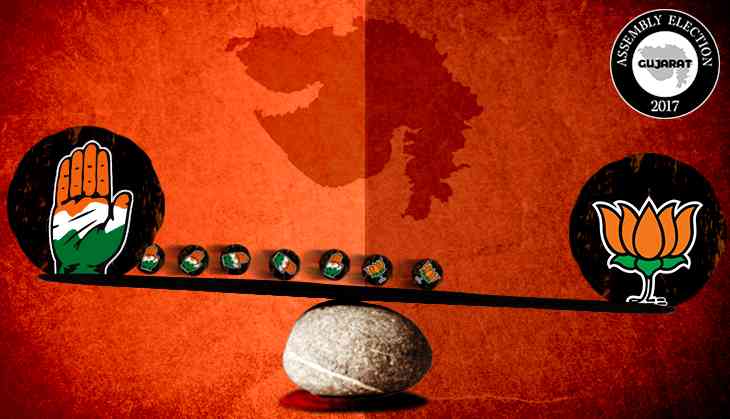
The verdict in Gujarat has handed reasons for celebration as well as introspection to the BJP and the Congress, both. If the Congress will be happy about the jump in the number of its seats, BJP too can take solace on account of a rise in its vote share.
Even as BJP's seats have come down from 116 to 99 in the 182 member Assembly, its vote percentage has gone up by a little over 1%, from 47.90% to 49.1%. Various factors could be held responsible for this but if one looks at the five regions of the state, one region stands out in terms of the seats there that have moved from the Congress to BJP.
In North Gujarat, the Congress has lost as many as seven seats that it held in the outgoing Assembly to the BJP. These include Kankrej, Kadi, Himatnagar, Prantij, Dahegam, Mansa and Kalol. In 2012, the Congress' had an edge over the BJP in this region, winning 17 of the total 32. The BJP bagged the remaining 15 seats.
However, the numbers have changed in 2017, with the BJP surging to 16 seats and the Congress declining to 16 others. The Congress managed to win over only six seats formerly held by the BJP – Vav, Radhanpur, Patan, Unjha, Becharaji and Gandhinagar North – even as seven of its own seats fell.
The sections dominating the electorate in this region include farmers, Patidars, OBCs and tribals. This means that those sections on whom the Congress was depending heavenly to turn around its fortunes appear to have failed in helping the party.
Presenting the BJP's governments in Gujarat as well as the Centre as anti-farmer was one of the main planks of the Congress' campaign. A section of the Patidars, led by Hardik Patel, and a section of OBCs, led by Alpesh Thakor, had risen in rebellion against the BJP and had created a popular sentiment against the party win the state.
Congress later got Thakor to join the party and made him contest from Radhanpur in North Gujarat, held by the BJP so far. The expectation was that he will engineer BJP's defeat on his own seat plus on other neighbouring ones where Thakurs have a sizeable presence. Patel neither joined the Congress nor entered into any alliance with it.
However, Congress did expect that the movements against the BJP collectively created by Patel, Thakor and Dalit leader Jignesh Mevani will eventually help the party in defeating the BJP. However, the results show that Patel and Thakore may have only had limited impact in North Gujarat.
Thakor was able to win his seat, Radhanpur and also deliver Patan to the Congress. However, he was expected to cast his influence across Banaskantha, Patan and Mahesana and he seems to have done not too well on that count. Similar is the situation in the Patel-dominated areas of Mehsana, Sabarkantha, Banaskantha and Patan, where BJP has done well.
Tribals appear to have saved the Congress's boat in North Gujarat as the party managed to retain its seats like Danta, Khedbrahma and Bhiloda.
Had the Congress retained the seven seats it has lost to the BJP, its revival and the BJP's decline would have been more pronounced. However, the Gujarat verdict has given both the parties as much reason to rejoice as to reflect. BJP will have to think how did its seat share fall from 116 to below 100 and the Congress will have to ponder why it could make a comeback only up to a point.



